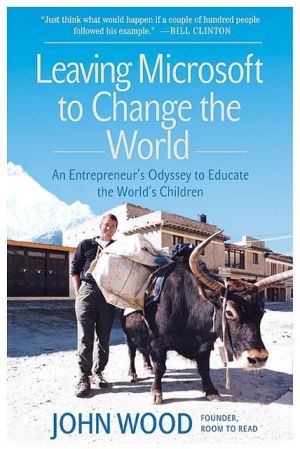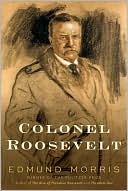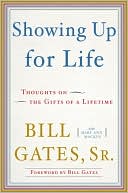Leaving Microsoft to Change the World: An Entrepreneur's Odyssey to Educate the World's Children
John Wood discovered his passion, his greatest success, and his life's work not at business school or helping lead Microsoft's charge into Asia in the 1990s but on a soul-searching trip to the Himalayas. He made the difficult decision to walk away from his lucrative career to create Room to Read, a nonprofit organization that promotes education across the developing world. By the end of 2007, the organization will have established over 5,000 libraries and 400 schools, and awarded long-term...
Search in google:
John Wood discovered his passion, his greatest success, and his life's work not at business school or helping lead Microsoft's charge into Asia in the 1990s but on a soul-searching trip to the Himalayas. He made the difficult decision to walk away from his lucrative career to create Room to Read, a nonprofit organization that promotes education across the developing world. By the end of 2007, the organization will have established over 5,000 libraries and 400 schools, and awarded long-term scholarships to more than 3,000 girls, giving more than one million children the lifelong gift of education. If you have ever pondered abandoning your desk job for an adventure and an opportunity to give back, Wood's story will inspire you. He offers a vivid, emotional, and absorbing tale of how to take the lessons learned at a hard-charging company like Microsoft and apply them to the world's most pressing social problems. Publishers Weekly It's a rare business book that not only provides savvy insights for better business practices but transcends the category altogether, to rank as an infectiously inspiring read. Wood takes the reader on an engaging journey from his life as a rather ordinary marketing director at Microsoft through the transformative decision to launch the nonprofit organization Room to Read (www.roomtoread.org), which has created more than 2,000 schools and libraries for children across Asia. From his first trip to Nepal, where he was struck by the country's 70% illiteracy rate, through his courageous decision to leave Microsoft, to the logistics of growing and expanding the Room to Read initiative, Wood endears himself to the reader with his introspection and honesty. Crediting his former employer with giving him the business skills and drive to aim high, he outlines the concrete steps he took to make his vision a reality. Marked by sincerity and savvy, this is the kind of book that business colleagues will discuss with their acquaintances, spouses and friends. (Sept.) Copyright 2006 Reed Business Information.
Leaving Microsoft to Change the World\ An Entrepreneur's Odyssey to Educate the World's Children \ \ By John Wood \ HarperCollins Publishers, Inc.\ Copyright © 2006 John Wood\ All right reserved.\ ISBN: 006112107X \ \ \ Chapter One\ \ "Perhaps, sir, you will someday come back with books"\ \ An icy wind blew off the mountain as I Zipped my fleece jacket against the encroaching night. Looking up from my journal, I watched the sun sink behind the soaring snowcapped Himalayas. Clouds appeared massed behind the ridgeline, ready to march into the valley like night sentries. A young Nepali boy interrupted to offer a drink. This eight-year-old appeared to be running the small trekker's lodge on his own; I had seen no one else during my two hours at the table.\ I asked if they had beer.\ "Yes!" was his enthusiastic reply.\ As I wondered about child labor laws, and whether this might be the youngest bartender I'd ever been served by, he ran off.\ On a normal day I would be ordering another coffee at sundown, preparing for the three or four hours left in my workday as a marketing director at Microsoft. Today was blissfully different--the first of 21 days of trekking in the Himalayas. I wanted the beer to toast the start of my longest holiday in nine years, and a break from the treadmill of life in the software industry during the breakneck 1990s. Ahead lay three weeks withoute-mail, phone calls, meetings, or a commute. Three weeks where the biggest challenge was walking 200 miles over "donkey trails" with all my gear on my back. On day ten, the trek would reach a Himalayan pass at 18,000 feet. This would be the highest I had ever climbed to in life. The challenging mountain pass and the long break would be a fitting reward for years of nonstop work.\ My bartender returned with a dusty bottle of Tuborg, which he wiped on his black shirt. "No chiso, tato," he said, apologizing for the beer being at room temperature. Then his face lit up. "Tin minut," he said as his spindly legs carried his body recklessly down to the river. As I waited the requested three minutes, he plunged the bottle into the icy glacier melt, smiled, and waved.\ A middle-aged Nepali man at the next table laughed aloud at the boy's clever, low-tech solution. "Who needs a refrigerator?" I asked as a way to start conversation. "Are all the children in Nepal this clever?" He replied that the people here needed to learn to make do, because they had so little. For example, dinner was cooked over a wood fire because people lacked luxuries like stoves and ovens.\ The boy returned with a very cold beer--and a look of triumph.\ Pasupathi appeared to be in his mid-50s, with thick glasses, weather-beaten dark pants, a Windbreaker, and a traditional Nepalese topi cloth cap. The sun and wind had carved fine lines of wisdom into his face over the years. The Nepalis, I quickly learned, are a friendly and welcoming people, and I struck up conversations with almost everyone.\ Pasupathi was eager to tell me about Nepal, so I asked him what he did for a living. "District resource person for Lamjung Province," he explained. He was responsible for finding resources for the 17 schools in this rural province. I noticed his worn-out tennis shoes. In Nepal, that meant that most of the schools were off the main road and far out on the dirt paths I had spent the last seven hours trekking.\ I told Pasupathi that I had always loved school as a child and asked whether Nepalese children were eager learners.\ "Here in the rural areas we have many smart children," he replied with a rapid-fire assessment. "They are very eager to learn. But we do not have enough schools. We do not have sufficient school supplies. Everyone is poor so we cannot make much investment in education. In this village, we have a primary school, but no secondary school. So after grade five, no more schooling takes place unless the children can walk two hours to the nearest school that teaches grades six and above. But because the people are poor, and they need their children to help with farming, so many of the students stop education too early."\ As Pasupathi poured himself tea, he told me more.\ "Some days I am very sad for my country. I want the children to get a good education, but I am failing them."\ Eager to learn more, I peppered him with questions. I found it hard to imagine a world in which something as random as where you were born could result in lifelong illiteracy. Had I taken my own education for granted?\ Pasupathi told me that Nepal's illiteracy rate, at 70 percent, was among the world's highest. This was not the result of apathy on the part of the people, he insisted. They believed in education. The communities and the government were simply too poor to afford enough schools, teachers, and books for their rapidly growing population. His job could be frustrating. Every day he heard about villages that lacked schools, or schools where three children were sharing a textbook. "I am the education resource person, yet I have hardly any resources."\ He had many dreams. For example, he wanted to help one village move up from a one-room building in which grades one to five were taught in shifts because the school was crammed into a small space. His enthusiastic voice dropped as he next described the reality of having no budget. All he could do was listen to the requests and hope that one day he could say yes.\ Our conversation drew me into his world and incited my curiosity. Here was a potential opportunity to learn about the real Nepal, rather than the trekker's version of the country. I asked where he was headed next. I lucked out. He was leaving in the morning to visit a school in the village of Bahundanda, which was along the trekking route. It was a three-hour walk up steep hills. I asked if I might join him. He agreed. "I would be proud to show you our school. Please meet me here again at seven for tea."\ \ Continues... \ \ \ \ Excerpted from Leaving Microsoft to Change the World by John Wood Copyright © 2006 by John Wood. Excerpted by permission.\ All rights reserved. No part of this excerpt may be reproduced or reprinted without permission in writing from the publisher.\ Excerpts are provided by Dial-A-Book Inc. solely for the personal use of visitors to this web site. \ \
\ From Barnes & NobleEight years ago, John Wood was on a firm, rising career path. As a marketing executive at Microsoft, he had a job that most professionals would envy. But then, on vacation in mountainous Nepal, he found a new mission. Leaving his job, Wood launched Room to Read, an organization that has developed a network of thousands of schools and libraries in poverty-plagued locales throughout Africa and Asia. Leaving Microsoft to Change the World tells the story of this personal sea-change, but it's also an engrossing account of how one man applied his business savvy to launch a successful altruistic project.\ \ \ \ \ Marc Andreessen"One-third business saga, one-third world travelogue, and one-third human drama — a 100% great book ...."\ \ \ Don Valentine"Room to Read is one of the best long-term investments I have made."\ \ \ \ \ USA Today"The bottom line is passion, and it seems the world is better off for John Wood having followed his."\ \ \ \ \ Publishers WeeklyIt's a rare business book that not only provides savvy insights for better business practices but transcends the category altogether, to rank as an infectiously inspiring read. Wood takes the reader on an engaging journey from his life as a rather ordinary marketing director at Microsoft through the transformative decision to launch the nonprofit organization Room to Read (www.roomtoread.org), which has created more than 2,000 schools and libraries for children across Asia. From his first trip to Nepal, where he was struck by the country's 70% illiteracy rate, through his courageous decision to leave Microsoft, to the logistics of growing and expanding the Room to Read initiative, Wood endears himself to the reader with his introspection and honesty. Crediting his former employer with giving him the business skills and drive to aim high, he outlines the concrete steps he took to make his vision a reality. Marked by sincerity and savvy, this is the kind of book that business colleagues will discuss with their acquaintances, spouses and friends. (Sept.) Copyright 2006 Reed Business Information.\ \ \ \ \ Library JournalIn this captivating memoir, Wood, who was a senior executive at Microsoft in the 1990s, tells how he went on to found and manage the successful global nonprofit Room to Read, which has so far established more than 2000 schools and libraries and donated over a million books to them throughout Asia (where Wood spent most of his Microsoft years). Because revenues are usually not factors in nonprofits' decision making, running these organizations is often challenging. Wood provides recipes for how to succeed at operating nonprofit firms globally, regardless of local cultures. He demonstrates how to overcome obstacles by managing for results and by showing donors clearly where, and on what, their dollars are being spent. Perhaps Wood is once again going through a career change: from impressive fund-raiser to exceptional writer. This enlightening book can be effectively integrated into graduate business, public administration, and human resource studies and will be equally enjoyed by general public library audiences.-Caroline Geck, Kean Univ. Lib., Union, NJ Copyright 2006 Reed Business Information.\ \ \ \ \ School Library JournalAdult/High School\ As much about business practices as about personal discovery, this book lives up to its name as it details how the author traded in the executive lifestyle to champion his own nonprofit organization, Room to Read. Wood describes his life at Microsoft as a marketing director for Australia and, later, China. Young business enthusiasts familiar with Steve Ballmer and Bill and Melinda Gates will be entertained by the glimpse into their respective management styles and by the author's efforts to pattern himself in their likeness. He also describes his lack of personal fulfillment and his eventual redirection, brought on by a visit to the mountains of Nepal. With vignettes from profitable fundraising activities for Room to Read, he documents how to successfully start up a nonprofit organization and how to sustain it. Originally named Books for Nepal, Wood's organization focused initially on providing books to the disadvantaged schools of Nepal, but eventually he expanded its scope (and renamed it) so as to include the building of schools, Tsunami relief, and educational programs for the children of Asia. Corporate-minded adolescents interested in giving back to society will enjoy this title and glean practical advice from it.—Brigeen Radoicich, Fresno County Office of Education, CACopyright 2006 Reed Business Information.\ \ \








